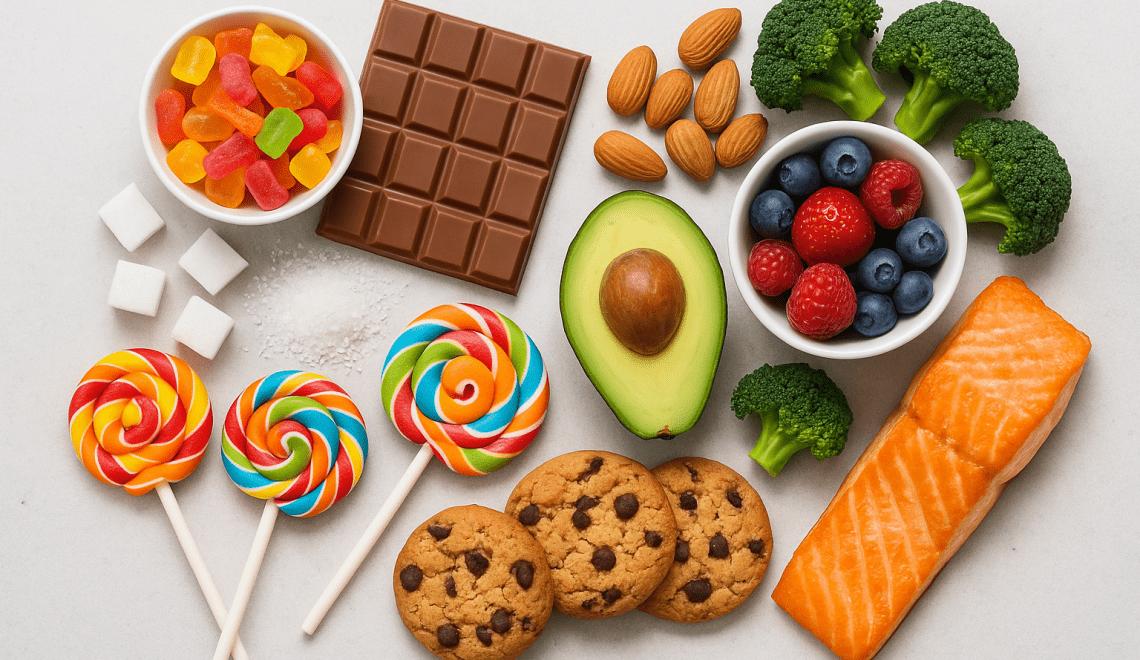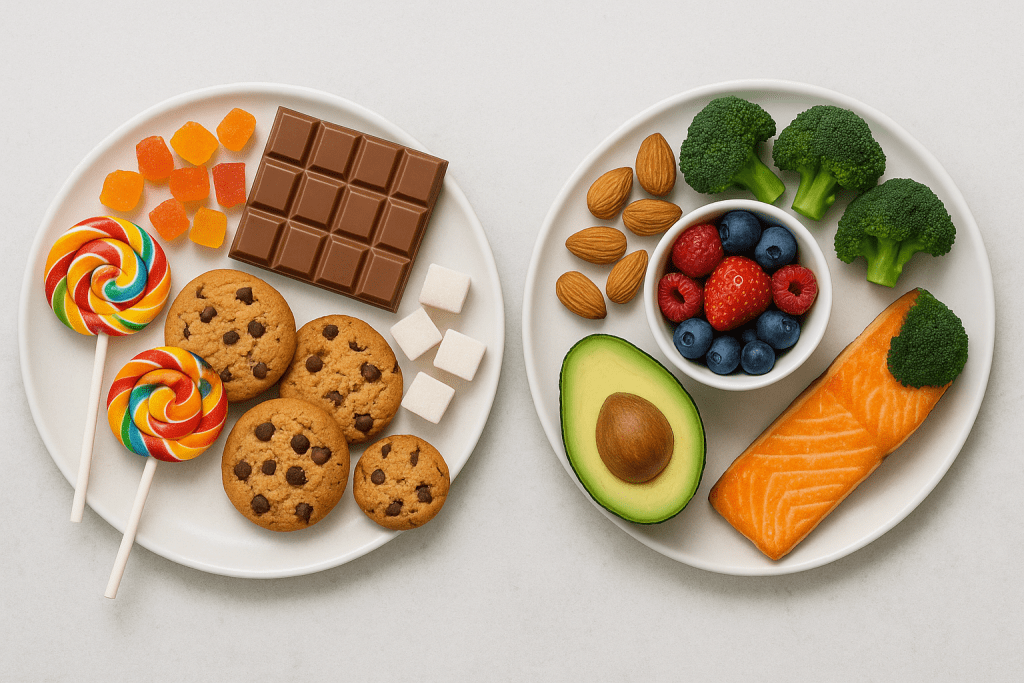
Are sugar crashes ruining your day? Many of us reach for sweet snacks to boost energy or lift our spirits — but is sugar really helping, or could it be behind your mood swings?
In this article, we’ll explore the effects of sugar on mood, the science behind those energy highs and emotional lows, and what you can do to stabilise your mental health naturally — including practical tools, a sample meal plan, and real-life stories.
How Does Sugar Affect Your Mood and Mental Health?
When you eat sugar, your brain gets a temporary dopamine hit — that “feel-good” hormone rush. But that quick boost is short-lived. Here’s why:
1. Sugar Causes Blood Sugar Spikes and Crashes
Refined carbs and sugary foods (like sweets, fizzy drinks, and white bread) rapidly spike your blood glucose. In response, your body releases insulin to lower your blood sugar — often overshooting the target. The result? A sugar crash, leaving you irritable, fatigued, and unfocused.
2. Sugar Increases Inflammation in the Brain and Body
Consistently high sugar intake triggers low-grade inflammation. Inflammatory markers can cross the blood-brain barrier and disrupt neurotransmitter function — including serotonin and dopamine, which are key to maintaining a stable mood.
📚 Benenden Health reports that this inflammation may be a hidden contributor to anxiety and depression symptoms, especially when sugar is consumed daily.
3. It Disrupts the Gut-Brain Connection
The gut microbiome directly influences mental health through the gut-brain axis. A high-sugar diet disrupts the balance of healthy gut bacteria, reducing your body’s ability to produce key mood-regulating chemicals like serotonin.
🌿 According to the Mental Health Foundation, a diet high in whole, unprocessed foods supports a healthier gut — and a healthier mind.
Sugar and Mental Health Conditions: Anxiety & Depression
While sugar affects everyone differently, those struggling with mental health conditions may be more sensitive to its effects.
- Anxiety: Blood sugar spikes can worsen anxiety symptoms like jitteriness, irritability, and restlessness. This is often mistaken for psychological causes when it’s actually physiological.
- Depression: Diets high in sugar have been linked to an increased risk of depression. The reason? Sugar may blunt the brain’s reward system over time, making it harder to feel pleasure and motivation.
Are You Experiencing Sugar-Related Mood Swings?
Here are common sugar withdrawal symptoms or signs that sugar may be sabotaging your mental clarity:
- Frequent mood swings or irritability
- Feeling sluggish or foggy after meals
- Cravings for sweet or starchy foods
- Afternoon energy crashes
- Heightened anxiety or low mood after eating sugar
If you recognise these symptoms, it may be time to cut back and focus on foods that promote emotional balance.
“I used to rely on biscuits and chocolate to get me through the workday. By 3 PM I was exhausted and anxious. After switching to low-sugar snacks and meals, I noticed I felt more even — like my mood wasn’t crashing every few hours.”
— Sarah, 34, Bristol
Natural Ways to Boost Mood Without Sugar
Ready to make the shift? Here’s how to nourish your brain and body — naturally.
✅ One-Day Low Sugar, Mood-Stabilising Meal Plan
Breakfast:
- Overnight oats with chia seeds, banana slices, and walnuts (Low-GI, high fibre)
Lunch:
- Quinoa salad with chickpeas, roasted veg, and avocado
- Side: Mixed berries and plain Greek yogurt
Snack:
- A handful of almonds and one boiled egg
Dinner:
- Grilled salmon, sweet potato mash, and steamed greens
- Herbal tea (like chamomile or lemon balm)
✅ Healthy Snack Alternatives to Beat Cravings

Instead of sugary snacks, try:
| Craving | Try This Instead |
|---|---|
| Chocolate | 2 squares of dark chocolate (70%+) with almonds |
| Fizzy drink | Sparkling water with lemon or cucumber |
| Cake | A date and oat energy ball |
| Biscuits | Apple slices with peanut butter |
| Sweets | Frozen berries or banana slices dipped in yogurt |
These low glycemic index foods for mood provide steady energy without the crash.
Balanced Blood Sugar = Balanced Mood
While occasional treats are fine, frequent sugar intake can lead to mood instability, irritability, and even symptoms of anxiety and depression. By focusing on whole foods, reducing refined sugar, and supporting gut health, you can experience a real, lasting boost in mental wellbeing.
For more information on how sugar impacts mental health, visit the NHS Eat Well Guide.
FAQs: Sugar and Mental Health
❓Does sugar make anxiety worse?
Yes. Sudden sugar spikes followed by crashes can increase symptoms of anxiety, such as nervousness and irritability.
❓What are sugar withdrawal symptoms?
You may feel tired, moody, or crave sweets intensely for a few days when cutting sugar — this usually improves within a week.
❓How long does it take to feel better after cutting sugar?
Many people notice improvements in energy, mood, and focus within 3–7 days after reducing refined sugar intake.
❓Is fruit sugar bad for mood?
No. Fruit contains fibre, vitamins, and water, which slow down sugar absorption and help maintain stable blood sugar.
❓What are natural ways to boost mood besides sugar?
- Moderate exercise
- Omega-3 rich foods (like oily fish or flaxseed)
- Exposure to sunlight
- Regular sleep
- Probiotic-rich foods (like kefir, sauerkraut)





